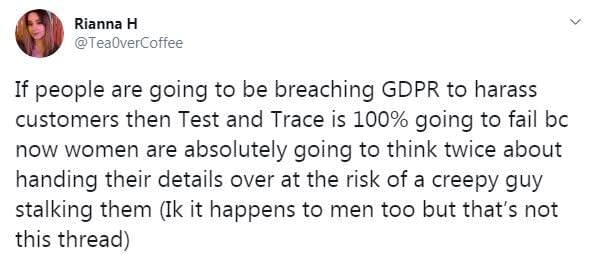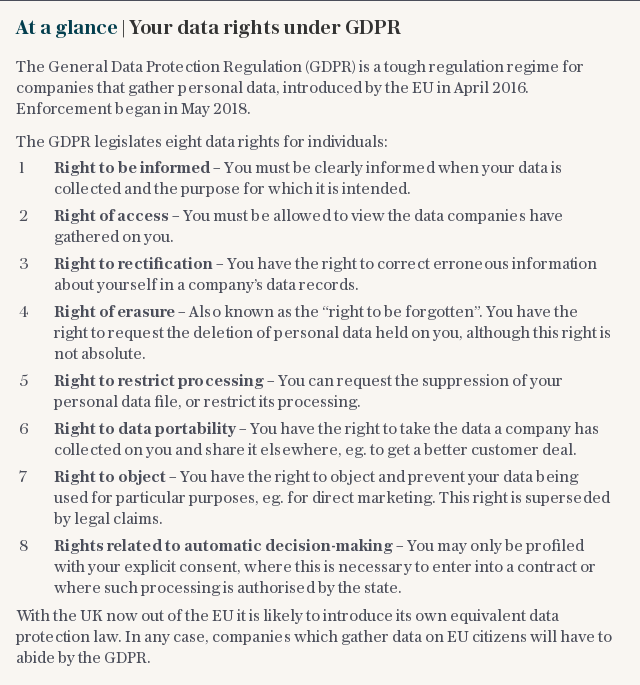Test and trace is being used to harass women - already

When a young French woman with a choppy fringe and gold earrings asked me for my number before she took my lunch order at a restaurant on London’s Bermondsey Street yesterday, I didn’t think twice. She did so jovially and I felt I was doing my bit, like wearing a mask or liberally applying hand sanitiser.
But there is a much darker, deeply troubling phenomenon emerging out of handing over data in restaurants and pubs in order to try to curtail the spread of Covid-19. Women are starting to report that staff are approaching them inappropriately, using their details to contact them in order to ask them out.
In the UK, a young woman reported on social media that a barman approached her on Facebook to ask her out for a drink after she’d visited the pub he was working in the day before. In New Zealand, after visiting a Subway restaurant and handing over requested personal information, another woman received an email, text and Facebook and Instagram requests from the man who served her. Speaking to local media she said, “I'd feel really, really scared [if I lived alone]. Even now I feel a bit creeped out and vulnerable”. The Subway employee has since been suspended.
For any woman who has been catcalled - something that the Everyday Sexism project reported a rise in during lockdown, with the streets much quieter - or felt an unwanted hand placed on the small of their back as they’ve moved through a crowd, received an AirDropped dick pick or simply endures the routine LinkedIn messages from middle-aged men asking to “connect”, this is not surprising.

Like any long-standing campaign that wants to avoid defeat, harassers are quick and agile in utilising new opportunities. Yet, perhaps worst of all, when it comes to track and trace, women have little choice but to be compliant. In terms of your health, it is in your best interest to hand over your data.
Being a woman, especially a young woman, in a public place can sometimes feel like an assault course, ducking and diving to avoid the onslaught of unwanted advances that some men feel so entitled to make. Think I’m exaggerating? A report by the Women and Equalities Committee in 2018 found that “sexual harassment pervades the lives of women and girls and is deeply ingrained in our culture”. The report cites recent studies which found that 85 percent of women aged 18–24 and 64 percent of women of all ages reported that they had experienced unwanted sexual attention in public places. Thanks to test and trace, those advances now have the facade of being state-sanctioned.
However, the Information Commissioner’s Office has made plain that “You cannot use the personal information that you collect for contact tracing for other purposes”. Jo O'Reilly, Data Privacy Advocate at ProPrivacy explains: “Staff with access to customer information need to understand that there will be consequences. This is both an abuse of customer trust and a breach of data protection laws that could see the business owners liable for a fine.”
In terms of self-protection, O’Reilly says “there's little you can do - unless you're willing to set up a different email account and buy yourself a burner phone just to see out the pandemic”. And, of course, if it happens to you it's important to report any misuse of your data to the business owner. But it shouldn’t be down to women to take such steps, and it doesn’t tackle the root of the problem.
Indeed, O’Reilly adds, there’s plenty that pubs, bar and restaurant owners can do. She recommends larger businesses using apps to store their our data, but “even if landlords opt for a low-tech approach, there are a few things they can do in order to keep details secure. If customers are being asked to write down their details, each person should be given a single piece of paper, that means no log books left on the bar filled with people's names and numbers”.

The obtaining and exploitation of data is a phenomenon that we should all be much more aware of as we go about our daily lives, and one companies and Government are increasingly responding to. But in the national collective effort to stop the spread of Covid-19, women shouldn’t have the added penalty of potential harassment.
The idea that an individual would see this public health crisis as a chance to harass a stranger is remarkable but not shocking. The culture that permits harassment makes no allowances for global pandemics, in fact, if anything the pandemic has reinforced that same culture.
Women have picked up most of the domestic duties and childcare, according to the Institute for Fiscal Studies; there has been a spike in domestic violence; the majority of underpaid frontline and care workers in this country are women, as are the majority of those in sectors such as retail and hospitality, and who now stand to lose their jobs.
The reaction to coronavirus has been to sink our heels into a power structure propping up a society that values women less than men. In this light, test and trace data intended to save lives being stolen to harass and intimidate women fits the same pattern. Be it either reactionary or opportunistic, we have used the pandemic and our “new normal” to exert misogynistic and sexist behaviours.
Right now, we continue to wait for the Government’s official test and trace app to eventually materialise. This, O'Reilly says, “will be about as secure/anonymous as it is possible to get”.
In the meantime, women will learn to live with the worry of harassment lingering in the back of their mind. The same way they do they walk past a large group of men or travel home alone late at night. Men using data to harass women will simply become yet another burden women carry as they go about their lives.


